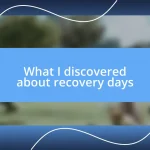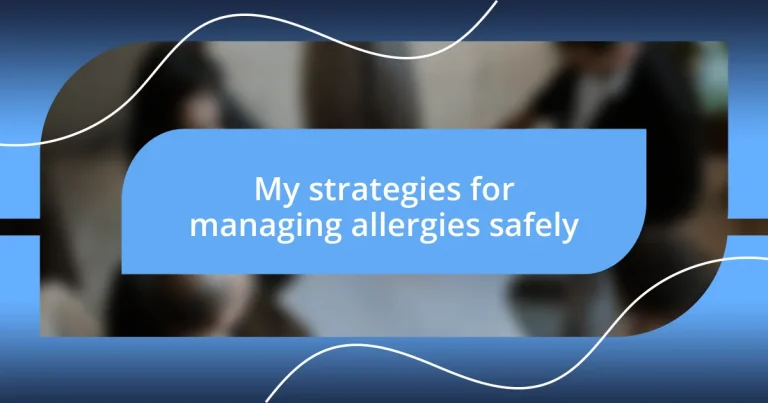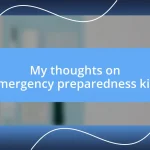Key takeaways:
- Understanding common allergy triggers such as pollen, dust mites, and specific food items is crucial for recognizing personal symptoms and managing reactions effectively.
- Creating an allergen-free environment through practical changes like using HEPA filters, washing bedding, and minimizing clutter can significantly reduce exposure to triggers.
- Consulting with allergy specialists provides tailored action plans and deeper insights into triggers, enhancing self-advocacy and effective management of allergies.
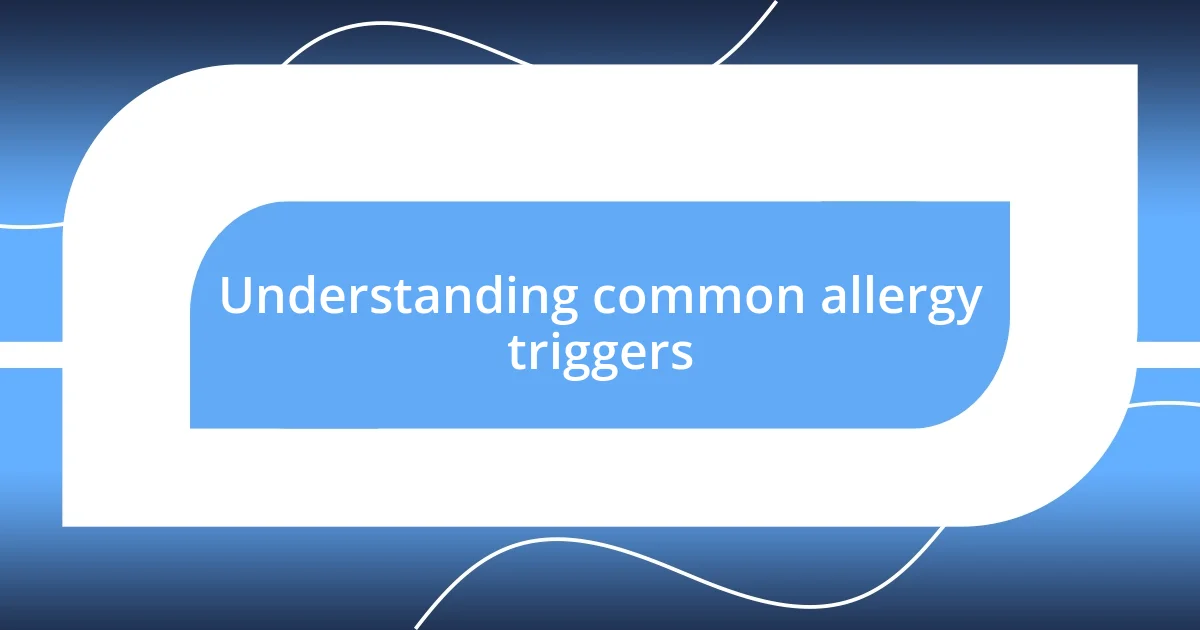
Understanding common allergy triggers
When it comes to understanding common allergy triggers, it’s astonishing how many things can set off an allergic reaction. I remember a summer picnic where I discovered that even the seemingly innocuous pollen from grass could leave me sneezing uncontrollably. It makes me wonder: how many people unknowingly brush off their symptoms without realizing it might be related to environmental factors?
Dust mites are another sneaky culprit that often goes unnoticed. I used to think my home was clean, but once I started experiencing itchy eyes and congestion, I realized these tiny invaders were cloaked in every soft surface. Have you ever thought about how often you come into contact with dust? The reality is that simple changes, like regularly washing bedding and using airtight containers, can significantly reduce your exposure.
Then there’s food allergies, which can be particularly challenging. I still recall the anxiety of eating out, unsure if the dish contained peanuts—one of my triggers. Have you experienced that heart-racing moment when you’re not sure if you can trust the ingredients? Knowing your triggers and how to identify them not only empowers you but also brings peace of mind in uncertain situations.
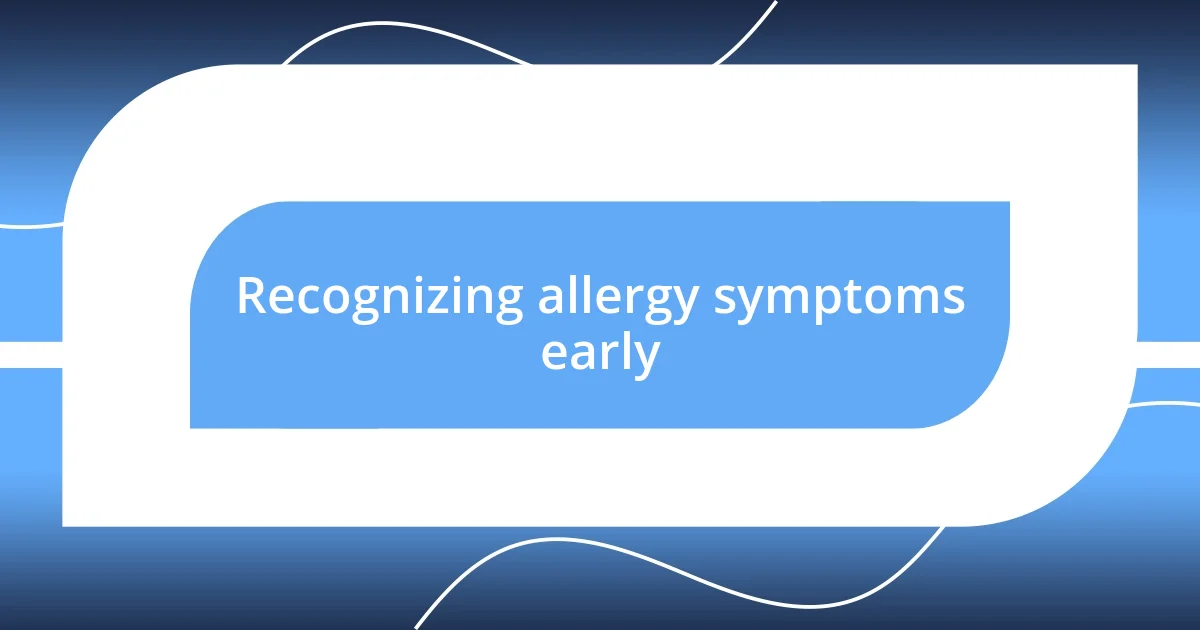
Recognizing allergy symptoms early
Recognizing allergy symptoms early is crucial for effective management. For instance, experiencing a sudden itchiness in my nose or a tingle in my throat often signals the onset of an allergic reaction for me. These symptoms, while mild at first, can quickly escalate if I don’t pay attention to them. Have you ever felt that sneezing fit come on unexpectedly? That’s usually my body’s way of waving a flag of warning.
It’s fascinating how subtle signs can easily be overlooked. One time, I brushed off a persistent headache, thinking it was just fatigue—only to find out later it was a reaction to mold in a friend’s basement. Identifying such early symptoms can make a significant difference. If you start to notice changes like hives or swelling, it’s essential to take them seriously. It’s all about the details; recognizing small changes in your body can lead to a better understanding of what’s happening.
Moreover, I’ve learned the value of keeping a symptom diary. A few months back, I started jotting down my allergy symptoms along with potential triggers. To my surprise, patterns emerged. I found that certain weather conditions, like high humidity, made my symptoms more intense. Tracking these early signs not only helps in identifying allergies but also enables you to communicate more effectively with healthcare providers.
| Symptom | Importance of Early Recognition |
|---|---|
| Itchy Eyes | Can indicate pollen or dust allergies and lead to more severe reactions if ignored. |
| Sneezing | Potential sign of exposure to allergens, needing immediate attention to avoid worsening symptoms. |
| Hives | Often indicate a food allergy; early recognition can prevent severe reactions like anaphylaxis. |
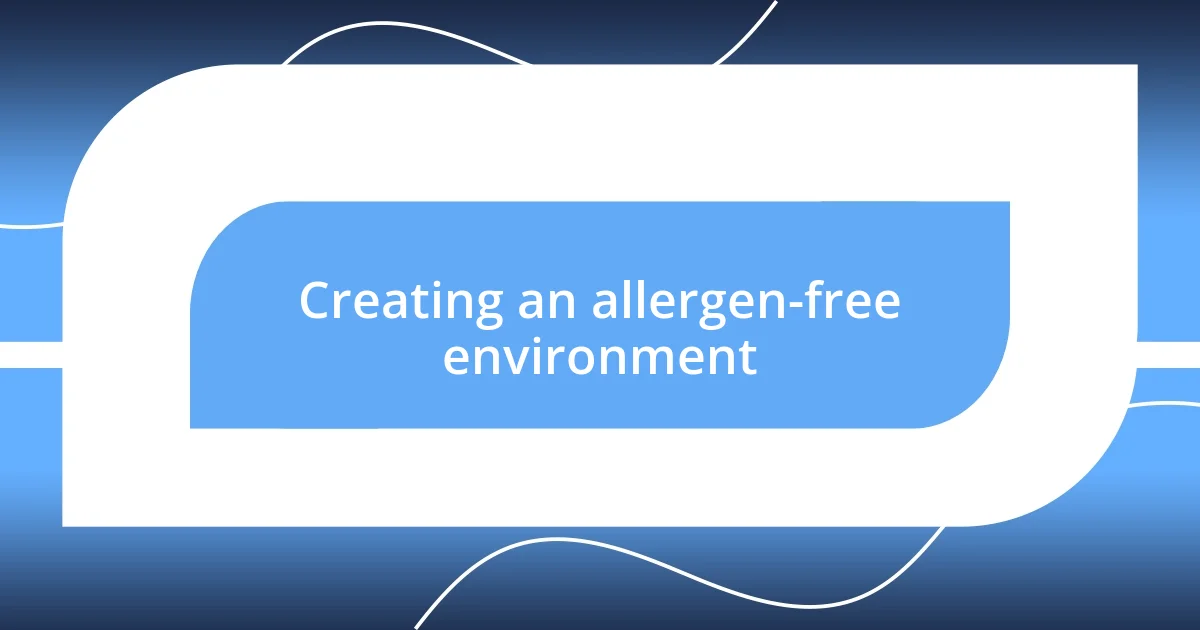
Creating an allergen-free environment
Creating an allergen-free environment requires thoughtful planning and consistent effort. In my experience, a few changes can lead to a noticeable improvement. For instance, I made it a point to replace carpets with hardwood floors, which has made a huge difference in reducing dust accumulation and allergens. Have you ever considered how often you clean or maintain your living spaces? Regular cleaning and smart choices can help manage those triggers.
Here are some practical tips to help you create a safer space:
- Use HEPA filters in your vacuum and air purifiers to capture tiny particles.
- Wash bedding weekly in hot water to eliminate dust mites and allergens.
- Minimize clutter to reduce dust-catching surfaces.
- Choose hypoallergenic products for bedding and furnishings to decrease exposure to allergens.
- Seal windows and doors tightly to prevent outdoor allergens from entering your home.
I remember a time when I had a friend over who brought her dog. Initially, I didn’t think much of it, but later that night, my eyes watered and I couldn’t stop sneezing. It was a clear moment that made me realize how important it is to be proactive in shaping my environment. Creating an allergen-free zone isn’t just about reducing symptoms; it also means creating a space where I can truly relax and feel at ease.
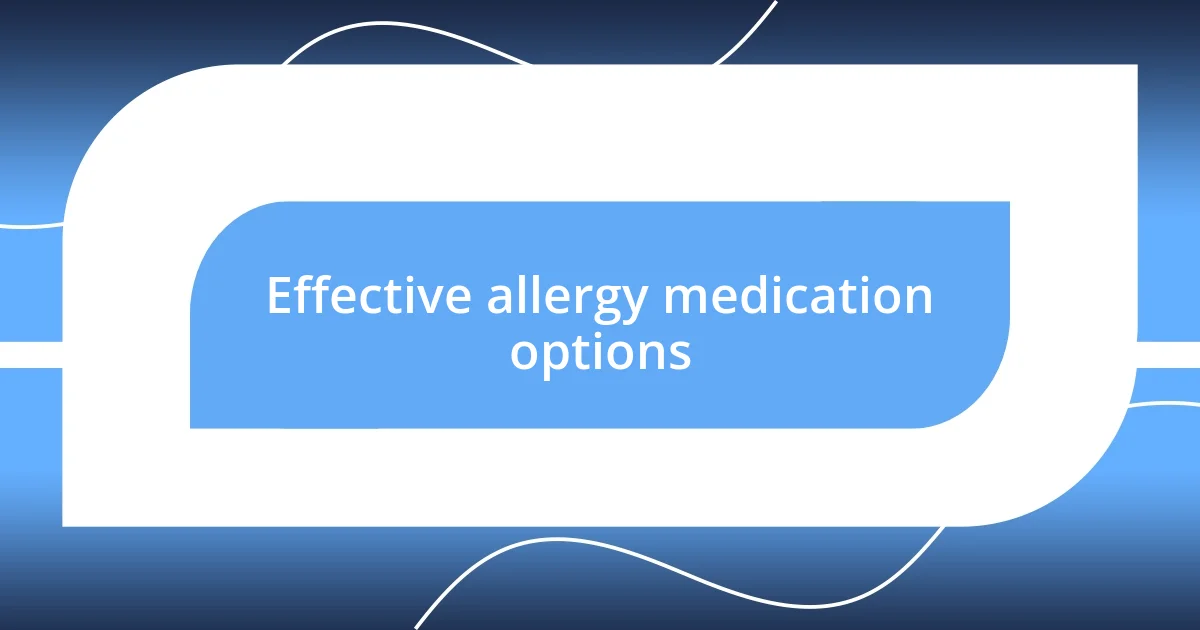
Effective allergy medication options
When it comes to allergy medication options, I’ve discovered a range of choices that can really help manage symptoms effectively. Over-the-counter antihistamines, like cetirizine or loratadine, are often my go-tos for seasonal allergies. They work quickly to block the histamines that trigger those annoying sneezing and itching fits. Have you ever felt the relief wash over you once the medication kicks in? It’s a game-changer in those frustrating moments.
For more severe reactions, carrying an epinephrine auto-injector has become a necessity. I remember a scary incident when I was at a family barbecue, and I inadvertently tasted a dish containing nuts. The realization that I had an allergic reaction hit hard and fast. Thankfully, I had my auto-injector on hand, and it was truly reassuring to know that I could act quickly. It’s crucial to understand what medication works for you—there’s no one-size-fits-all approach, and knowing how to respond can make all the difference.
In addition to the quick fixes, I’ve found that long-term solutions, like nasal corticosteroids, can help keep my environment and symptoms in check. Just the other day, I started using a saline nasal spray after experiencing persistent congestion, and it has been surprisingly effective. I was amazed at how such a simple solution could bring relief! This experience taught me that managing allergies is often about finding the right combination of treatments that work for our unique bodies. What strategies have you found most effective?
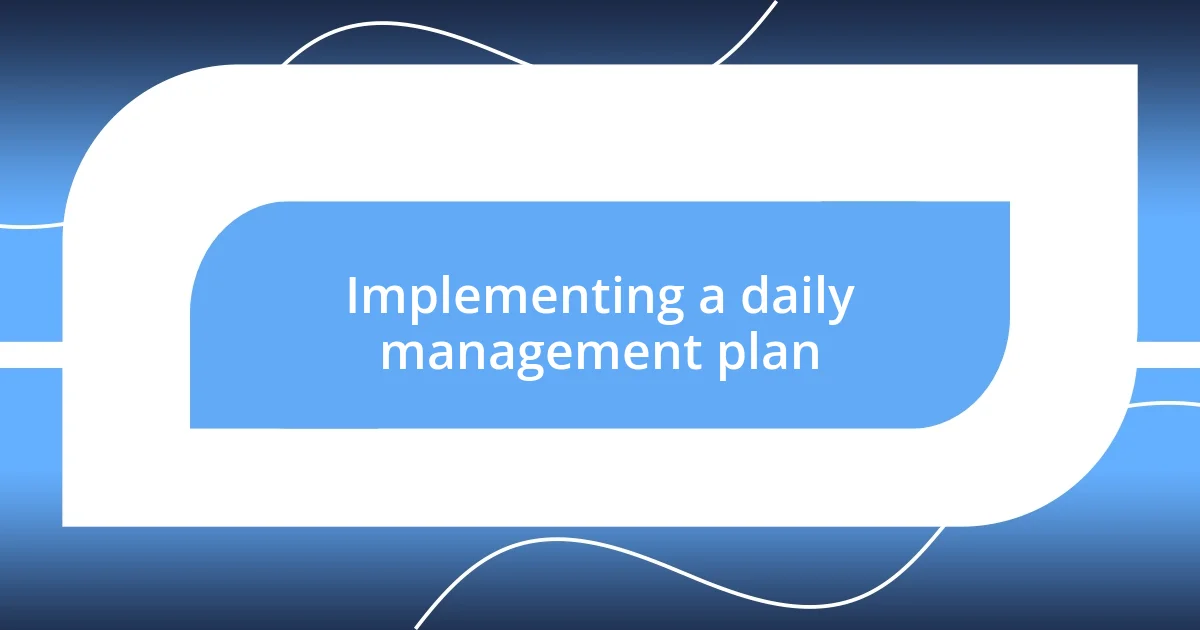
Implementing a daily management plan
Implementing a daily management plan is essential for anyone dealing with allergies. One strategy that I’ve found particularly effective is to establish a routine that incorporates regular check-ins with myself. For example, I’ve set reminders on my phone to track pollen counts and adjust my activities accordingly. Have you ever noticed how a little forethought can change your day? Knowing that pollen levels are high prompts me to stay indoors and take my medication on time, which can really make a difference in how I feel.
Another crucial element I include in my daily plan is meal prep. I carefully read labels and keep a list of safe foods to avoid any surprises. I remember when I first started doing this; there was a time I was at a party and unknowingly grabbed a snack that contained an ingredient I was allergic to. That experience taught me the importance of preparation, and now, I’m far more vigilant. It’s about creating a sense of control over my environment, right down to what I consume.
Additionally, I prioritize self-care practices to manage stress, recognizing that stress can exacerbate allergy symptoms. I like to carve out time each morning for deep breathing exercises or a short yoga session. This not only helps clear my mind but also boosts my immune response. Isn’t it fascinating how our mental and physical health intertwine? By nurturing both aspects, I feel better equipped to tackle whatever allergens come my way that day.
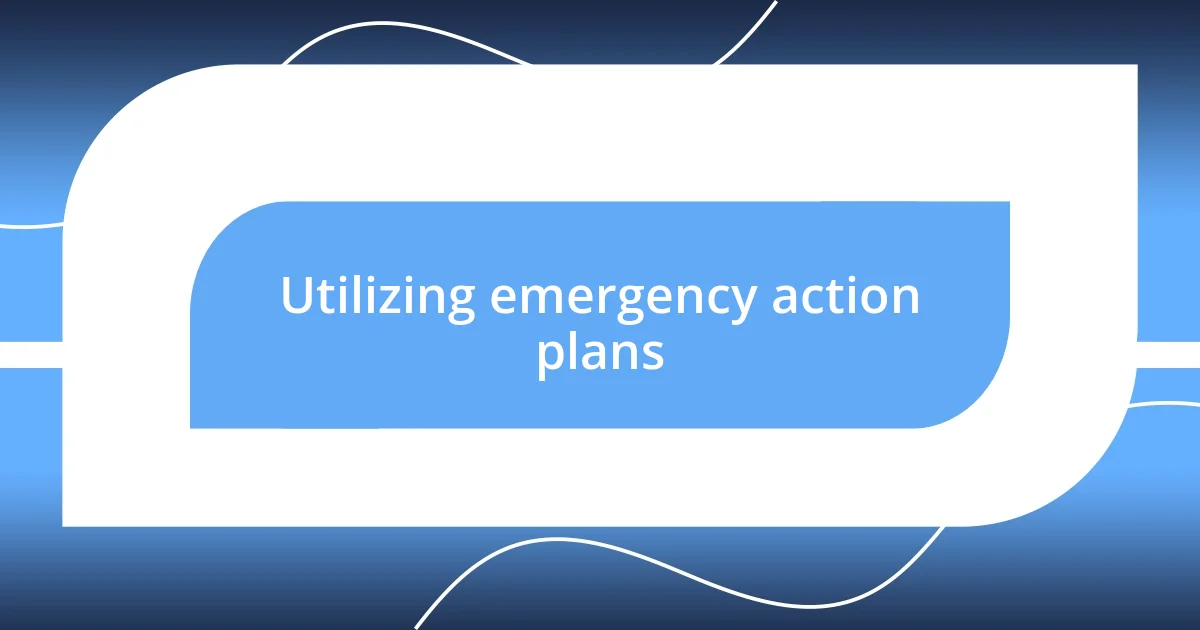
Utilizing emergency action plans
When it comes to utilizing emergency action plans, having a clear step-by-step outline can be a lifesaver. I still recall the first time I sat down to create my plan; I almost felt overwhelmed, but breaking it down into simple actions calmed my nerves. For instance, knowing that I need to use my epinephrine auto-injector within minutes of realizing I’m having a severe reaction provides me with a sense of empowerment. Isn’t it comforting to know you have a roadmap in those high-stress moments?
It’s also essential to share your emergency plan with those close to you. One time, I found myself at a crowded concert, and a friend had to step in when I started experiencing a reaction. Having prepared her beforehand made all the difference; she knew exactly what to do and didn’t panic. It made me realize that emergency plans are not just for our benefit; they’re vital for those around us too. Who wouldn’t feel a little more secure knowing their friends have their back?
I’ve found that regularly practicing the steps of my emergency action plan keeps it fresh in my mind. Just last month, I did a mini drill at home to reinforce my response. I enlisted a family member to help simulate a reaction scenario, and honestly, I felt a surge of confidence afterward. It’s almost like creating muscle memory for moments when clarity is critical. Have you considered practicing your plan with someone? It’s an invaluable way to ensure you’re ready when it matters most.
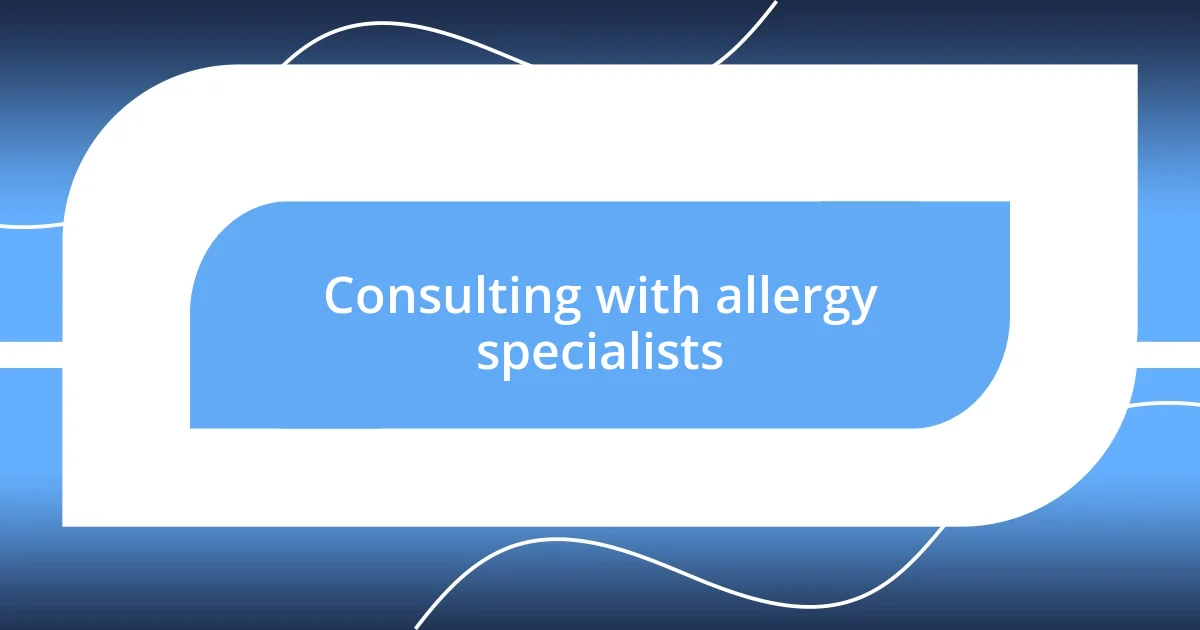
Consulting with allergy specialists
When consulting with allergy specialists, I can’t stress enough how beneficial it has been for me. The first time I met with an allergist, I walked in feeling overwhelmed but left with a tailored action plan that truly addressed my specific needs. Have you ever felt that relief when experts take the time to listen and understand your struggles? Their knowledge transformed my approach to allergies, turning confusion into clarity.
I remember discussing my symptoms in detail, and my specialist ran various tests that helped pinpoint my triggers. The moment I learned that I was allergic to a certain type of pollen, it felt like I was finally unlocking a puzzle. It’s almost surreal how a simple blood test can lead to such profound insights. That got me thinking; how often do we fail to connect the dots without professional guidance? It’s easy to assume a mysterious itch or sneezing fits are just a normal part of life, but consulting an expert can shed light on the complexity behind our health.
During follow-up visits, I realized that it’s not just about the prescribed treatments; it’s also about building a relationship where I felt safe to ask questions. I remember feeling hesitant to voice my concerns about a new medication I was introduced to. But once I opened up, my allergist patiently explained the benefits and potential side effects, reassuring me that my health was their priority. This experience taught me that seeking a specialist also means advocating for yourself. After all, isn’t it empowering to have someone in your corner, guiding you through such a personal journey?



